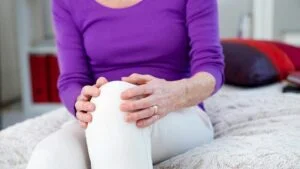As women enter the transitional phase of menopause, they often find themselves grappling with a myriad of physical and emotional changes. One commonly overlooked aspect is the potential worsening of arthritis symptoms during this time. Menopause and arthritis share a complex relationship, and understanding how they intersect is crucial for effectively managing discomfort and maintaining a good quality of life. In this blog, we’ll explore the connections between menopause and arthritis and provide various menopause arthritis treatments for navigating this challenging period.
Contents
What Is The Connection Between Menopause And Arthritis?
 The connection between menopause and arthritis is multifaceted, primarily influenced by hormonal changes that occur during this transitional phase in a woman’s life. The key hormone at play is estrogen, which plays a significant role in maintaining joint health. As estrogen levels decline during menopause, various factors come into play, contributing to the link between menopause and arthritis:
The connection between menopause and arthritis is multifaceted, primarily influenced by hormonal changes that occur during this transitional phase in a woman’s life. The key hormone at play is estrogen, which plays a significant role in maintaining joint health. As estrogen levels decline during menopause, various factors come into play, contributing to the link between menopause and arthritis:
- Estrogen and Joint Health
Estrogen has anti-inflammatory properties, and its decline during menopause may lead to an increase in inflammation in the body. This helps in maintaining the balance of fluids in joints, promoting flexibility and reducing stiffness. Its reduction can contribute to joint discomfort.
- Changes in Bone Density
Menopause is associated with a decline in bone density. As bone density decreases, the risk of developing osteoarthritis, a common type of arthritis, may increase.
- Impact on Collagen Levels
Estrogen plays a role in collagen production, a key component of joint cartilage. Reduced estrogen levels can affect collagen synthesis, potentially contributing to joint deterioration.
- Inflammation and Autoimmunity
Menopause can trigger an increase in systemic inflammation. This is linked to various types of arthritis, including rheumatoid arthritis. The immune system may become more susceptible to attacking the joints.
- Joint Pain and Menopausal Symptoms
Joint pain and stiffness are common symptoms during menopause. These symptoms may be exacerbated by the presence of arthritis or other joint-related conditions.
- Genetic Predisposition
Genetic factors may also play a role. If there is a family history of arthritis, women may be more predisposed to developing arthritis during menopause.
- Metabolic Changes
Hormonal changes during menopause can affect metabolism, potentially contributing to weight gain. Increased body weight can put additional stress on joints, worsening arthritis symptoms.
Understanding this intricate connection is crucial for women entering menopause. Consulting with healthcare professionals can provide personalized strategies to navigate this challenging phase with greater comfort and well-being.
What Are The Best Menopause Arthritis Treatments?
 Menopause arthritis treatments involve a holistic approach that addresses both hormonal changes and joint health. While there is no one-size-fits-all solution, a combination of lifestyle changes, medical interventions, and support strategies can significantly improve symptoms. Here are some of the best menopause arthritis treatments:
Menopause arthritis treatments involve a holistic approach that addresses both hormonal changes and joint health. While there is no one-size-fits-all solution, a combination of lifestyle changes, medical interventions, and support strategies can significantly improve symptoms. Here are some of the best menopause arthritis treatments:
Hormone Replacement Therapy (HRT)
Hormone Replacement Therapy involves the administration of estrogen, typically in combination with progestin. This treatment aims to mitigate the impact of declining estrogen levels during menopause, which can contribute to joint pain and stiffness. By replenishing estrogen, HRT helps regulate inflammatory responses and maintain joint health. However, it is essential to weigh the potential benefits against the risks, as HRT may have side effects and associated health considerations.
Nonsteroidal Anti-Inflammatory Drugs (NSAIDs)
Nonsteroidal Anti-Inflammatory Drugs, such as ibuprofen and naproxen, are commonly used to alleviate arthritis symptoms. They work by reducing inflammation and providing relief from pain associated with joint conditions. While effective, long-term use of NSAIDs can lead to side effects like gastrointestinal issues and increased risk of cardiovascular events. Therefore, healthcare professionals often monitor their use and may recommend alternative treatments or lower doses for long-term management.
Disease-modifying antirheumatic Drugs (DMARDs)
Disease-modifying antirheumatic Drugs are often prescribed for autoimmune forms of arthritis, such as rheumatoid arthritis. These medications work to slow down the progression of the disease by targeting the immune system. DMARDs are crucial for preventing joint damage and improving long-term outcomes. However, they require careful monitoring due to potential side effects, and their use is typically managed in collaboration with a rheumatologist.
Physical Therapy
Physical therapy is a cornerstone of arthritis management during menopause. A skilled physical therapist designs exercises tailored to an individual’s needs, focusing on improving joint function, enhancing flexibility, and strengthening supportive muscles. Low-impact activities like swimming and cycling are often recommended to minimize stress on the joints. Regular physical therapy sessions empower individuals to manage arthritis symptoms and improve their overall quality of life.
Joint-Friendly Diet
Adopting a joint-friendly diet can significantly impact arthritis symptoms. Emphasizing foods rich in omega-3 fatty acids, such as fatty fish, and incorporating antioxidants from fruits and vegetables helps combat inflammation. Avoiding processed sugars and saturated fats, which can contribute to inflammation, is equally important. A well-balanced and nutritious diet not only supports joint health but also contributes to overall well-being.
Weight Management
Maintaining a healthy weight is crucial for managing arthritis symptoms, as excess weight puts additional stress on joints. During menopause, hormonal changes can contribute to weight gain. Adopting a combination of regular exercise and a balanced diet supports weight management. Low-impact exercises like walking and swimming are gentle on the joints and aid in calorie expenditure. Weight loss, if necessary, can significantly reduce the burden on affected joints, alleviating pain and improving overall joint function.
Mind-Body Techniques
 Incorporating mind-body techniques into a daily routine can be beneficial for managing arthritis symptoms during menopause. Practices such as yoga, meditation, and mindfulness help reduce stress and promote relaxation. Stress reduction is vital because stress can exacerbate inflammation and worsen arthritis symptoms. These techniques not only contribute to emotional well-being but can also have a positive impact on physical health, including joint function and pain management.
Incorporating mind-body techniques into a daily routine can be beneficial for managing arthritis symptoms during menopause. Practices such as yoga, meditation, and mindfulness help reduce stress and promote relaxation. Stress reduction is vital because stress can exacerbate inflammation and worsen arthritis symptoms. These techniques not only contribute to emotional well-being but can also have a positive impact on physical health, including joint function and pain management.
Acupuncture
Acupuncture, a traditional Chinese medicine practice, involves the insertion of thin needles into specific points on the body to stimulate energy flow. Many individuals with arthritis find relief from pain and stiffness through acupuncture. While the exact mechanisms are not fully understood, acupuncture is thought to influence the nervous system and release natural pain-relieving substances. It’s essential to seek a qualified and experienced acupuncturist and communicate openly about symptoms and treatment goals to optimize the benefits of this alternative therapy.
Topical Treatments
Topical treatments, such as creams, gels, or patches, offer localized relief for arthritis symptoms. These formulations often contain Nonsteroidal Anti-Inflammatory Drugs (NSAIDs), capsaicin, or other pain-relieving ingredients. Applying these directly to the affected joints can provide targeted pain relief without some of the systemic side effects associated with oral medications. It’s important to follow the recommended usage guidelines and consult with a healthcare professional to ensure the safety and effectiveness of these topical treatments.
Support Networks
Establishing a strong support network is invaluable for women navigating arthritis during menopause. Joining support groups or seeking counseling can provide emotional support and a platform to share experiences. Connecting with others facing similar challenges can reduce feelings of isolation and empower individuals to cope effectively. Online communities, local support groups, and counseling services can offer valuable resources for emotional well-being, creating a sense of solidarity among women managing arthritis and menopausal symptoms.
Overall, a comprehensive approach to managing arthritis during menopause involves a combination of lifestyle modifications, alternative therapies, and a supportive network. Tailoring these strategies to individual needs and consulting with healthcare professionals ensures a holistic and effective management plan for arthritis symptoms, promoting a better quality of life during this transitional phase.
What Supplements Are Good For Menopause Joint Pain?
 Several supplements may be beneficial in managing joint pain during menopause. It’s essential to note that individual responses to supplements can vary, and it’s advisable to consult with a healthcare professional before adding any new supplements to your routine. Here are some supplements that are commonly considered:
Several supplements may be beneficial in managing joint pain during menopause. It’s essential to note that individual responses to supplements can vary, and it’s advisable to consult with a healthcare professional before adding any new supplements to your routine. Here are some supplements that are commonly considered:
- Calcium and Vitamin D: Calcium is crucial for maintaining bone health, and vitamin D aids in calcium absorption. Both are essential for preventing bone density loss. This can contribute to joint pain during menopause.
- Omega-3 Fatty Acids: Found in fish oil supplements, omega-3 fatty acids have anti-inflammatory properties. They may help reduce inflammation in the joints and alleviate pain associated with arthritis. Fish oil supplements are widely available and can be a valuable addition to a joint-friendly diet.
- Glucosamine and Chondroitin: These compounds are components of cartilage, the tissue that cushions joints. Some studies suggest that glucosamine and chondroitin supplements may help reduce joint pain and improve joint function, particularly in individuals with osteoarthritis.
- Turmeric/Curcumin: Turmeric contains curcumin, a compound with anti-inflammatory and antioxidant properties. Some studies suggest that curcumin supplements may help reduce arthritis symptoms, including joint pain and stiffness.
- Vitamin K2: Vitamin K2 plays a role in bone metabolism and may help improve bone density. It works in conjunction with vitamin D to support bone health, potentially reducing joint pain associated with bone loss during menopause.
- Magnesium: Magnesium is involved in bone health and muscle function. Adequate magnesium levels may help reduce muscle and joint pain. It’s important to maintain a balance between calcium and magnesium intake for optimal bone health.
- Vitamin C: Vitamin C is an antioxidant that supports collagen formation, an essential component of joints. Adequate vitamin C intake may contribute to joint health and reduce the risk of connective tissue problems.
- B Vitamins: B vitamins, especially B6 and B12, play a role in joint and bone health. Ensuring adequate intake of these vitamins may support overall joint function.
It’s important to approach supplements with caution and discuss them with a healthcare provider. They can assess individual needs, and potential interactions with medications, and ensure that the chosen supplements are safe and appropriate for your specific health conditions.
Conclusion
In conclusion, menopause arthritis treatments involve a holistic approach that combines lifestyle adjustments, medical interventions, and a supportive network. Understanding the link between hormonal changes and joint health is crucial for women entering this transitional phase. Hormone Replacement Therapy (HRT) and medications like NSAIDs or DMARDs can provide relief, but lifestyle changes such as maintaining a healthy weight, adopting joint-friendly diets, and practicing mind-body techniques are equally vital.
Moreover, seeking support from a healthcare professional and connecting with others facing similar challenges through support groups can empower women to navigate menopause and arthritis with resilience. Ultimately, fostering a better quality of life during this unique life stage. If you are facing menopause-related issues, menopause treatment at HerMantra can help. Book your free trial online menopause treatment session now.


